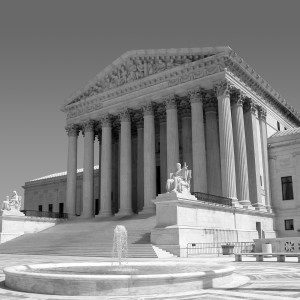There is precedent.
When President Joe Biden declared that he would name a black woman to the U.S. Supreme Court, some Americans recoiled. How dare he be race-specific.
Tucker Carlson, TV host for Fox News Channel, mockingly said, in that case, Biden should name George Floyd’s sister to the high court. Carlson’s wisecrack suggests any Black woman will do for Biden, regardless of qualifications.
That was an insult to the Court and women everywhere.
Even insulting to Justice Stephen Breyer, 83, who is retiring from the Court and who spoke of American democracy as an “experiment” during his farewell speech.
Former President Ronald Reagan — an icon in Republican eyes — continued that experiment in 1980 when, during his campaign, he declared he would name a woman to the Supreme Court.
Sure enough, during Reagan’s first year in office, Justice Potter Stewart announced on June 18, 1981, he was retiring which led to history-making Justice Sandra Day O’Connor.
Reagan wrote in his diary on July 6, 1981: “Called Judge O’Connor and told her she was my nominee for Supreme Court. Already the flak is starting and from my own supporters. Right to Life people say she is pro-abortion. She declares abortion is personally repugnant to her. I think she’ll make a good justice.”
But professionally, in a 1992 Planned Parenthood case, O’Connor upheld the concept of Roe v. Wade, stating the government should have limited say over the most private of decisions.
A woman on the high court; the precedent had been set.
O’Connor cherished a special bond with Justice Thurgood Marshall. “I was a minority, and so was he,” she recalled, noting that she regarded him as “the only certified American hero with whom I served.” As an attorney, Marshall had argued on behalf of the NAACP the case of Brown v. Board of Education before the Supreme Court, which led to the overturning of separate but equal segregation laws.
President Lyndon Johnson delivered a major assist to the Civil Rights Movement when he chose Marshall for the Court in 1967. Marshall, the first Black justice, served until 1991.
That’s a precedent.
Then, in Reagan’s second term, he appointed the late Antonin Scalia to the Supreme Court. It has been revealed that Reagan nominated Scalia to the Court at least in part because he was an Italian-American.
That fact came to light from Reagan’s former White House counsel, Peter Wallison, in a 2003 interview with the Miller Center of Public Affairs’ Presidential Oral History Program.
Wallison said, “In the course of our discussion with Reagan the first time we were talking about the candidates . . . we had talked about Scalia. Reagan had asked me whether Scalia was of Italian extraction. I think he used the word ‘extraction,’ and I said, ‘Yes, he’s of Italian extraction.’ Reagan said, ‘That’s the man I want to nominate, so I want to meet him.’ We brought Scalia in… . The president met Scalia, and he offered Scalia the job right on the spot, in about 15 minutes, very little ceremony here. Scalia accepted on the spot. He was delighted. That was it…
“I think (Reagan) felt that it would be great to put an Italian-American on the Supreme Court. He had all the usual American instincts: ‘We don’t have an Italian-American on the court, so we ought to have one.’ He really felt good about doing that. It wasn’t principle so much as that kind of emotional commitment.”
Wallison’s recollection reminds me of a poignant anecdote from Green Bay Packers Hall of Fame linebacker Dave Robinson.
Packers legendary Coach Vince Lombardi sometimes was the focus of anti-Italian-American prejudice. Before a 1960 preseason game against Washington held in Winston-Salem, N.C., Lombardi and his wife, Marie, were denied restaurant service. The setting was the summer when Lombardi maintained a Coppertone-like tan; his hair was naturally curly.
Robinson recalled the incident, explaining, “I wasn’t there, but, paraphrasing, the maître d’ said, ‘Well, we don’t allow Blacks in this restaurant.’ Vince said, ’I’m not Black, I’m Vince Lombardi.’ The maître d’ said, ‘I don’t care who the hell you are, you’re not bringing that blond woman in this restaurant to have dinner.’”
Now we have the second Italian-American, Samuel Alito, in the Court’s 233-year history.
During a 2016 book-promotion appearance before a packed house at the Newseum in Washington, Justice Breyer remarked, “The Supreme Court does not react to the weather, but it sometimes does change with the climate.”
This time, the climate change centers around the first Black woman on the U.S. Supreme Court. And that’s precedent.

